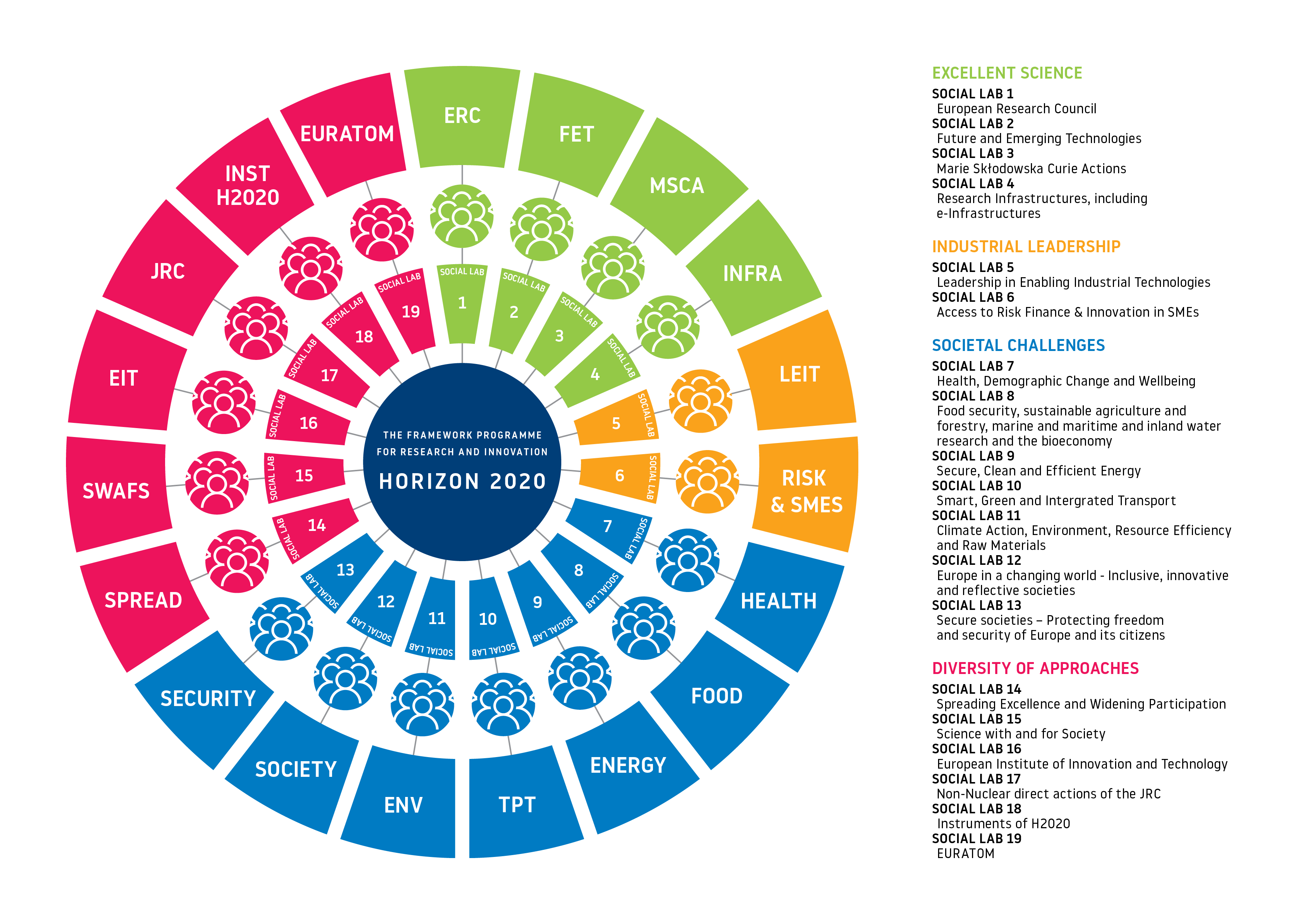What do we mean when we talk about Social Labs?
A Social Lab is a container of social experiments for addressing complex ground-breaking social challenges on a systemic level. In the NewHoRRIzon project these are social challenges related to Responsible Research and Innovation (RRI) within the frame of Horizon 2020 (H2020) and beyond (Framework Programme 9 and national R&I funding programmes).
The NewHoRRIzon project runs 19 Social Labs. Each Social Lab focuses on a different theme of H2020, for example, Future and Emerging Technologies (FET), Leadership in Enabling and Industrial Technologies (LEIT) and Smart, green, and integrated transport (TPT).
Social Labs consist of a team, a process and space(s) supporting social innovation and experimentation. The team is made up of societal actors invited into the Social Lab to work together on the Social Lab process. The process consists of three interdependent, iterative activities:
- diagnosis of the current RRI practices with H2020. This results in an understanding of barriers and enablers of embedding of RRI.
- designing & implementing of social experiments to test overcoming the barriers
- reflect on the outcomes of the experiments & to learn lessons for further experimenting and future embedding of RRI into R&I policies & funding programmes.
Social Labs offer spaces that facilitate this process. They enable diagnosis, observation and experimentation to take place at the same time and as part of the same intertwined process.
Click on the Social Labs in the image below to get more information.

Social Lab 1
Social Lab 2
Social Lab 3
Social Lab 4
Social Lab 5
Social Lab 6
Social Lab 7
Social Lab 8
Social Lab 9
Social Lab 10
Social Lab 11
Social Lab12
Social Lab 13
Social Lab 14
Social Lab 15
Social Lab 16
Social Lab 17
Social Lab 18
Social Lab 19
What do we mean when we say Social Labs are social?
Social Labs are social because:
- they address complex social challenges that are not to be solved by a technological fix approach
- they require a transformative approach to socio-operational patterns, social design and imaginaries, institutions, business models and value chain heuristics, regulatory and policy practices as well as, potentially, stakeholder identities, attitudes and behaviour.
- the issue at hand is approached by all stakeholders in concert negotiating their stakes as well as positions, engagement and impact.
What do we mean when we talk about stakeholders?
Stakeholders are societal actors that are involved in or are impacted by the R&I process addressed by the Social Lab. Their stake in the R&I process may be having a legitimate interest, a valuable resource, a risk to tackle or the combination thereof.
What do we mean when we say Social Labs are labs?
Social Labs offer a real-life environment to conduct social experiments. After the experiments have been designed by Social Lab participants they are tested in a practical context hosted by one of the participants. Practical contexts, for example, can be (existing) R&I projects or other types of R&I trajectories in host organisations.
What do we mean when we talk about social experiments?
A social experiment is an intervention that is co-designed by the on the Social Lab participants and then tested within host organisations. The aim of the social interventions is to overcome barriers to the embedding and implementing of RRI. . Social experiments, for example, create openings that change the flow of information, the patterns of operation, the structure of governance or the societal actors involved. They may propose the addition of new elements to the existing process or change the course of action in more radical ways.
Social experiments are built around a consensus of the participants. Also they are based on a non-coercive acceptance of the host organisation offering the practical context to do the experiment. Each Social Lab aims to conduct three iterative cycles of social experimentation within their respective part of H2020.
